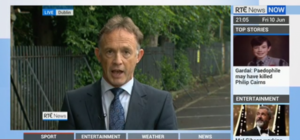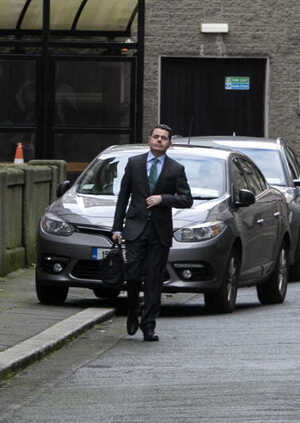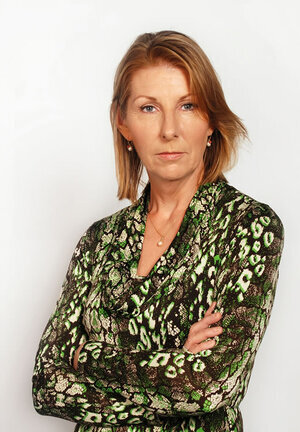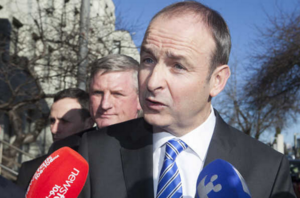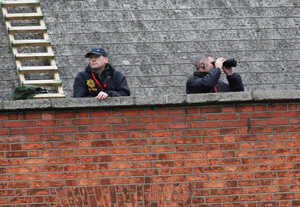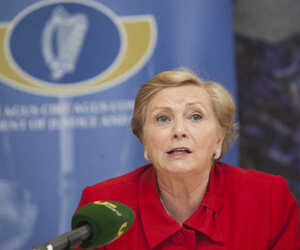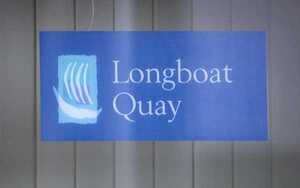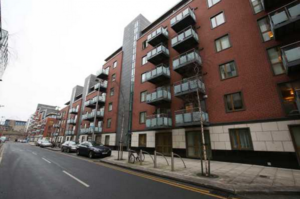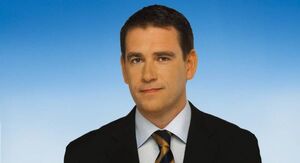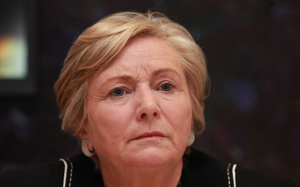
Tanaiste and former Minister for Justice Frances Fitzgerald
This lunchtime.
On RTÉs News At One.
Aine Lawlor interviewed Tanaiste and former Minister for Justice Frances Fitzgerald about what she knew, when, in relation to the legal strategy employed by the former Garda Commissioner Noirin O’Sullivan against Sgt Maurice McCabe at the O’Higgins Commission of Investigation.
During the interview, Ms Fitzgerald said she received an email in May 2015 stating a criminal charge against Sgt McCabe had been raised at the commission and that it had been claimed that this charge hadn’t been properly investigated.
Ms Fitzgerald said she was told a row ensued between the counsel for Sgt McCabe and the counsel for the commissioner at the commission because of this claim.
Ms Fitzgerald said the email was based on information that an officer in the Attorney General’s office gave to a Department of Justice official in a phone call in May 2015.
After the interview, just as Leaders’ Questions began in the Dail, Fianna Fail leader Michael Martin told the Dail that just before he entered the Dail chamber…
“I took a phonecall from Maurice McCabe, he’d been on to another deputy. And he is adamant that such an issue was never raised during the O’Higgins inquiry. And he’s taking very serious issue with the remarks of the Tanaiste on the News at One today. And my understanding is that he will be issuing a statement.”
Readers will recall how on May 6, 2014, Sean Guerin SC, after examining allegations of Garda misconduct made by Sgt McCabe, Mr Guerin recommended that a Commission of Investigation be held into the complaints.
This would eventually lead to the setting up of the privately held O’Higgins Commission of Investigation in 2015.
At the outset of the O’Higgins Commission, counsel for the then Garda Commissioner Noirin O’Sullivan and An Garda Siochana Colm Smyth SC said it would argue Sgt McCabe was making complaints about Garda misconduct because he had a grudge and that evidence of this would be based on a meeting Sgt McCabe had with two gardai, Supt Noel Cunningham and Sgt Yvonne Martin, in Mullingar in August 2008.
Broadsheet has previously reported how it was also claimed at the O’Higgins Commission of Investigation by Chief Supt Colm Rooney that Sgt McCabe had sought a meeting with him in 2007 demanding that the DPP’s directions – in respect of an “dry humping” allegation made by the daughter of a guard previously disciplined by Sgt McCabe in 2006 – be overturned.
The commission was told this was the basis of a grudge held by Sgt McCabe and the reason behind him making complaints about Garda misconduct.
However.
The DPP’s directions were categorically in Sgt McCabe’s favour. They included the line:
“Even if there wasn’t a doubt over her credibility, the incident that she describes does not constitute a sexual assault or indeed an assault… there is no basis for prosecution.”
At the beginning of the O’Higgins Commission of Investigation, An Garda Siochana weren’t aware that Sgt McCabe had been verbally, but fully, briefed of the DPP’s directions on the same day they were issued in April 2007.
Sgt McCabe gave evidence on day two of the commission – Friday, May 15, 2015 – in which he explained his knowledge of the DPP’s directions and how he had no desire for them to be overturned as he was very satisfied with them.
This hasn’t been reported elsewhere.
Readers will also recall how Broadsheet has previously reported how, on that same Friday afternoon, Michael McDowell SC, for Sgt McCabe, called for documentary evidence to be produced to support the claim that Sgt McCabe wanted the DPP’s directions overturned.
Over the following weekend, and in response to Mr McDowell’s request, a five-page document compiled by the then Chief State Solicitor Eileen Creedon, now a High Court judge, was introduced to the commission on Monday, May 18, 2015 – day three of the commission.
In Ms Creedon’s letter, she stated:
“[In relation to the 2008 meeting in Mullingar] … “Superintendent [Noel] Cunningham was accompanied to this meeting by Sergeant Yvonne Martin. Notes were taken at the meeting and countersigned by Sergeant Martin, and a detailed report of the meeting was prepared by Superintendent Cunningham, and its contents agreed with Sergeant Martin, and forwarded to Chief Superintendent [Colm] Rooney.”
“In the course of this meeting Sergeant McCabe advised Superintendent Cunningham that the only reason he made the complaint against Superintendent [Michael] Clancy was to force him to allow Sergeant McCabe to have the full DPP directions conveyed to him.”
However.
A tape recording of the meeting, produced by Sgt McCabe, contradicted Ms Gleeson’s assertions.
The claim about the grudge and the claim about the grudge being made known at the meeting were dropped by the Garda Commissioner’s legal counsel.
But they were never included in the commission’s final report.
In addition, it’s been claimed by Labour TD Alan Kelly that a phonecall was made from the Commissioner’s office to the secretary general of the Department of Justice Noel Waters on May 15, 2015.
The purpose of that alleged call is unknown.
Last week, Mr Waters announced he’s stepping down from his role in February.
Readers will recall how, after the report of O’Higgins Commission of Investigation was published in May 2016 – which didn’t outline any of the details above, Mick Clifford, in the Irish Examiner, and Katie Hannon, of RTE, reported how Ms O’Sullivan’s legal counsel made the claim about 2008 Mullingar meeting and how Sgt McCabe’s tape recording proved this not to be the case.
There have since been calls to know exactly what the Department of Justice and the then Minister for Justice Frances Fitzgerald knew of this legal strategy.
Last week, Taoiseach Leo Varadkar told the Dail Ms Fitzgerald learned of the legal strategy when it became public knowledge – which is May 2016.
But last night, Ms Hannon reported on Claire Byrne Live that a Department of Justice spokesperson confirmed to her this week that Ms Fitzgerald was first made aware in May 2015.
Further to this…
From News At One:
Aine Lawlor: “I think, minister, and just to clarify again so we’re not at cross purposes. The questions here are not in relation to whether you’re the person drawing up the strategy. The question is are you the person being informed about what’s going on? There was a row at the tribunal [sic] in May 2015. The O’Higgins Commission was told that evidence would be produced to show that whistleblower Maurice McCabe who had fought so long and so hard to be able to tell his story and suffered so much for it, that he would be shown to be somebody with a grudge.
“We’re told the Department was informed. Who told you then?”
France Fitzgerald: “Let me be clear: what emerged last week from and what the Department were referencing yesterday was that there was a conversation between an official in the Department of Justice and the Attorney General’s office. The Attorney General’s office officer told an official in the department in a telephone conversation…”
Lawlor: “Was this Noel Waters?”
Fitzgerald: “And that an issue had arisen at the tribunal in relation to the approach that the counsel for An Garda Siochana were taking. And that the counsel for Sgt Maurice McCabe had objected very strongly to that. Because it was raising an issue about a criminal, a serious criminal complaint which his counsel felt had nothing to do with the current situation. And this was then put in an email by the official who had taken the phonecall. The Department discovered that email last week and I was informed towards the end of the week, in relation to this. Now when I…can I…”
Talk over each other
Lawlor: “Sorry minister, because you’ve said a fair bit but you still haven’t answered the question: were you, because the department says now, as of last night, you were aware of this. Who told you what in May 2015 about that row?”
Fitzgerald: “What I’ve said to you is that the department discovered an email last week when they were trying to answer various questions that had come in. They found an email that record that details of this conversation that it had been sent to me at that point and that it is..”
Lawlor: “The email was sent to you?”
Fitzgerald: “Let me finish.. that it specifically said in the email that there was no function for me getting involved in a Commission of Investigation and anybody’s evidence before it that it would be actually a criminal act by me if I was to get involved in that. Now when I…”
Lawlor: “Did you read that email Tanaiste?”
Fitzgerald: “When I spoke to the Taoiseach, let me just say this Aine, when I spoke to the Taoiseach what I explained was that all of the information that came out in May 2016, about garda witnesses, about tapes. All of that, that was leaked, I had absolutely no knowledge about any of that until May 2016 and that is what I had said to the Taoiseach and that is what he was commenting on when he spoke in the Dail.”
Lawlor: “Ok, I’ll come onto May 2016 in a minute but let’s just stay with May 2015. There’s this row at the tribunal. There is a conversation between the AG’s office and somebody in your Department, you haven’t told us whom.”
Fitzgerald: “That’s right.”
Lawlor: “And you are sent an email about this. Did you read that email?”
Fitzgerald: “Well I don’t remember that particular email.”
Lawlor: “Do you remember getting information about this?”
Fitzgerald: “One of the reasons that I don’t remember it is because it actually specifically said that I had no function in relation to evidence before a tribunal, given by any party. What I have done and what I…”
Lawlor: “So you don’t remember?”
Fitzgerald: “I don’t remember that particular email but the department found it last Thursday and I, I spoke to the Department and saw what was in it. But the point is that it specifically said I had no role in relation to it. Now what I did do, though Aine, and I think it’s very important to say this is that from the moment I became Minister for Justice I did absolutely everything to make sure that any discussion that I would have with the Garda Commissioner in relation to whistleblowing was about making sure that whistleblowers were protected, supported, that the way they were dealing with it in An Garda Siochana, they brought in Transparency International, my constant focus was to, and any time any thing was raised in the Dail, was to discuss and say you know, you’ve got to look after whistleblowers properly…”
Lawlor: “Tanaiste, given that you couldn’t remember what you had been told in May 2015. Why when Mick Clifford and Katie Hannon reported in May 2016 that actually the State had argued that Maurice McCabe was simply a man with a grudge and if he he hadn’t secretly recorded the conversation with other gardai, that might have stuck. Why did you not have your memory jogged? And speak about that in the Dail in 2016?”
Fitzgerald: “I was not party to what was going on at the O’HIggins Commission. You know the O’Higgins Commission was private and as minister, I remember saying at the time, when there was part information leaked that I couldn’t comment on part information when I didn’t have the full facts and what I said was we’d set up and what I did was set up the Charleton tribunal which is now examining the specifically that legal strategy but I didn’t know about that legal strategy but that commission, that tribunal is examining precisely what the approach was to the evidence and the approach that the gardai took. I meant he Charleton Tribunal which is where, if anybody has any information, or any TD, or any member of the public has information about this issue, it should go to the Charleton Tribunal now which this house set up, and or course the Department of Justice is also part of that those terms of reference.”
Lawlor: “You didn’t know about this, of course, minister, and you can’t remember the email but the fact of the matter is did the penny not drop even in May 2016? That if it were not for the media, if it were not for Maurice McCabe’s own tapes, because he didn’t trust by that stage, at that stage, because of everything he had been through, that man could have been left out to dry and not believed. The O’Higgins Commission may not have said the things you’ve just quoted about. The Charleton Tribunal may never have happened and that would have happened on your watch as minister for justice. Because you weren’t remembering it was the media that were publishing.”
Fitzgerald: “That’s a quite unfair description because what I did, as minister, when I got the Guerin Report, I set up the O’Higgins Commission. Every act I took, in my role as Minister for Justice, was to support whistleblowers and then when this issue about the strategy, the legal strategy which we’ve yet to hear, from the Charleton Tribunal, precisely what that legal strategy was, I have set up a specific term of reference in the Charleton Tribunal.”
Lawlor: “So you were expressing support for Maurice McCabe in the Dail, praising him, but you were also, when the leaks came out instead of saying ‘oh my gosh, yes, I got an email, I remember that now’. You were condemning those leaks as illegal, did you not remember the email you’d been sent at the time, telling you that this was a strategy condemning…”
Fitzgerald: “What I was saying was that it was part of the story and as minister for justice, I couldn’t operate on the basis of leaks that were coming out. And indeed, Aine, it’s very important to remember there’s a tribunal sitting at the moment, to examine specifically the issue of that strategy and whether there was a strategy in place. I cannot assume what that strategy was. What is referenced in the email is an event at the tribunal in relation to a disagreement between two counsel and the details around that. That’s what’s referenced. It’s not about an overall strategy.”
Later
Lawlor: “And you’ve told us in this interview that the Chief State Solicitor’s Office was dealing with the Attorney General on this. Did you have any conversations with the Attorney General…”
Fitzgerald: “The Chief..sorry? The Chief State Solicitor, no, the Attorney General and a department of official that had the conversation that was then reported to me.”
Lawlor: “OK, did you discuss this with the Attorney General?”
Fitzgerald: “No, I didn’t discuss the details of this because it wasn’t my role to be discussing anybody’s strategy at the tribunal.”
Lawlor: “Why? It was fair enough for the State to argue that Maurice McCabe had a grudge?”
Fitzgerald: “But I do not have evidence, I do not have evidence that the State were arguing that Maurice McCabe had a grudge?”
Lawlor: “Well there was a row about it in May 2015 and…isn’t that what we were talking about Tanaiste?”
Fitzgerald: “No, no, the information that was shared from the Attorney’s office at that point was that – about the disagreement between the two counsel down at the tribunal. It was, I…I was not involved…”
Lawlor: “And what were you told they were disagreeing about?”
Fitzgerald: “..in the legal strategy.”
Lawlor: “What were you told they were disagreeing about?”
Fitzgerald: “About the fact that a serious criminal charge which Sgt McCabe had denied had been raised.”
Lawlor: “What kind of criminal charge, did you not ask?”
Fitzgerald: “Well you know, it’s, I, it wasn’t for me to get into the details in relation to it, the criminal charge.”
Lawlor: “You were the minister for justice…”
Ftizgerald: “The criminal charge had been, had, you know, there had been I think subsequently, there has been detail in relation to that but what I was, what was reported to me, the allegation had been that a serious criminal complaint against Sgt McCAbe, which he had always denied had not been properly investigated by the Garda Siochana. That was the allegation.”
Lawlor: “And that’s in the email is it?”
Fitzgerald: “That, that, that is the only detail in relation to the specific of the complaint against the two of them.
Lawlor: “And that’s what the email says, is that right?’
Fitzgerald: “The allegation had been that a serious criminal complaint against Sgt McCabe, which he’d always denied, had not been properly investigated and that was the source of disagreement between the two counsel.”
Listen back in full here
Previously: Absence of Malice
The Legal Strategy Against Maurice McCabe
UPDATE:







